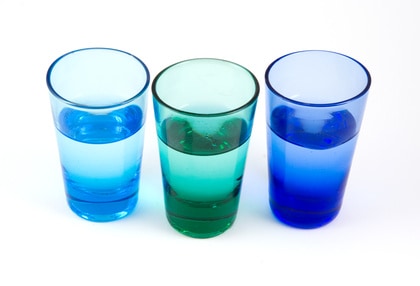
Drinking game with Vodka
What’s the best Vodka?
Who is able to answer the ultimate question that all Vodka drinkers have in mind? No expert is really able to compare all existent Vodkas, of course. The “Slate”-Magazin tested some Premium Vodkas. Let’s see who wins.
Are there any differences?
Stupid question, ey? Of course there are. But so-called experts like the “Bureau of Alcohol, Tobacco, Firearms and Explosives” in the USA defines Vodka as a “neutral spirit without distinctive character, aroma, taste or color.” Obviously, these experts never compared one shot-glass full of Vodka to the other. They never drank a cheap Vodka and compared it with a Premium brand.
Even in a Vodka cocktail, you trace differences when you use different Vodka brands every time you mix one. What I like most about Vodka is that you can enjoy the clean liquid at any occasion and in any context. Americans seem to think the same, as they buy far more Vodka than any other liquor. The differences between Vodka brands result from filtering details and distillery secrets. They stem from the used grains and starches which cause different smells, distinctive characteristics or a specific aftertaste. Vodkas can be smooth or harsh, even medical. No Vodka-lover would ever mix a real great Vodka into a cocktail. The Vodka-test we are now enjoying, involved eleven Russian friends of the author and a lot of snacks eaten inbetween. Eleven easily obtaineable Premium Import Vodka brands were tested. Flavored Vodkas were ruled out. The Vodkas were consumed chilled in frosted shot glasses. None of the testers knew which brand he was enjoying at the time. The best Vodka could get up to five symbolic shot glasses as a reward. You can imagine that every member of this testing round had substantial hangover the day after.
Vodkas can be very different
French “Cîroc”-Vodka, distilled from grapes, did not win the interest of the eleven testers. They came to the conclusion that this Vodka was a Grappa or something the like, trying to be recognized as a Vodka. The team disqualified this drink for being a very untypical Vodka. Estonian “Türi”-Vodka was the next in line. The reputation of this rye-drink among bartenders may be great, but the test-team was of different opinion. They detected a sticky sweetness and an industrial aftertaste. One member of the Slate-Magazines expert-team even refused to fuel his lawn mower with “Türi”-Vodka. Obviously, these experts can not be bought. One symbolical shot glass was given to “Türi”. Swedish “Absolut”-Vodka – made from wheat – should be known to every Vodka lover by now. The advertising campagne is great. Many Americans love this Vodka. The judges in this contest did not follow. They detected an antiseptic quality, followed by an unremarkable finish and gave this Premium-brand only two shot glasses. At least, “Absolut”-Vodka qualified as a mixing ingredient for cocktails. Polish “Belvedere“-Vodka, a rye-product, did not convince the blind-date-jury either. Some liked it, some didn’t. Only the bottle of “Belvedere”-Vodka convinced. The liquid got away with two shot glasses plus a chaser. At this time we ask ourselves if the testers began to be influenced by the alcohol intake the already had summed up.
The next candidates, please
Everyone would think that Russian “Stolichnaya“-Vodka, distilled from wheat, would make it to the top. But the taste of “Stoli” did not improve in the meantime. The merits of this Vodka were questioned. The bottle was found to be classic. The Vodka itself was described as “another midshelf-spirit masquerading as a Premium-brand”. And that was that. Obviously, it is a matter of individual preferrences, if you like Stoli. A score of three shot glasses later, the next candidate was tested. Would “Grey Goose” make it? This French Premium Vodka is distilled from a mixture of wheat, barley and rye. But this multi-awarded Vodka did also not convince. The testers found it neutral, bland and smooth. Half of the team ruled that “Grey Goose” is soft and subtle, even solid, but unremarkable. The rest of the testers was bored. The surprising and non-compromising verdict: Only three shot glasses for “Grey Goose”. “Ketel One”-Vodka, made from wheat in a Netherland distillery, scored in similar height, plus a chaser on to. One of the judges said that this Vodka is, what “Absolute”-Vodka promises to be. Hear, hear! Russian “Zyr”-Vodka, made form rye and wheat, also got three shot glasses and a chaser. It was found to be “well-suited” for serious drinking. Not too bad!
The great finale
In a lightening round, the testers finished off some shots of “Jewel of Russia Classic”, distilled from rye and wheat. None of the testers ever tasted this Vodka before. Among the Russian Vodkas, this liquid got good notes. Within the whole testing block, “Jewel of Russia Classic” convinced with a score of four shot glasses. Curtains up for Scottish “Armadale”-Vodka, distilled from wheat and barley. The verdict was four shot glasses and a chaser – which is absolutely smart. But the winner of this unconventional Vodka contest is: Polish “Chopin”-Vodka. This potato-made Premium Vodka is unique among the other potato-candidates one already knows. Smoth, slightly oily and all in all well-rounded, it convinced the jury absolutely. The bottle got an extra bonus for its design. By far the best pure Premium Vodka the jury tested.
